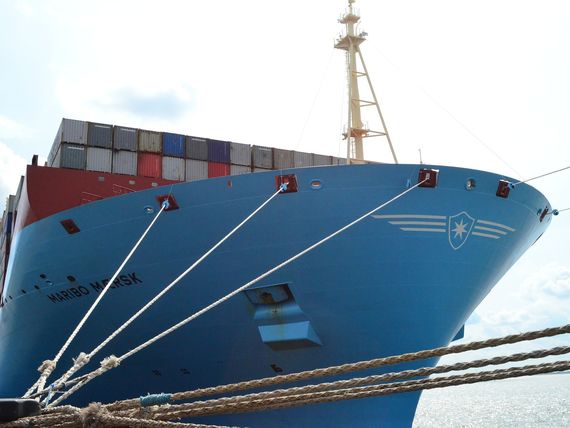Maersk slates exclusive new service between Montreal and Mediterranean

May 24, 2018 - Already a major player on container services between Montreal and Northern Europe, Maersk has announced an exclusive weekly service with the Mediterranean to cater to rising demands of importers and exporters on both sides of the Atlantic.
Starting in early July, the Mediterranean-Montreal Express service will also offer direct calls to Halifax, upgrading Maersk’s transatlantic coverage amidst robust trade flows and the perceived positive spin-off from last fall’s free trade agreement between Canada and the European Union.
“We are delighted over this news which validates the strategic importance of the Port of Montreal and the Montreal business model,” Tony Boemi, VP of growth and development of the Port of Montreal Authority, told the American Journal of Transportation. He also evoked Montreal’s proximity to key markets with large populations such as Quebec, Ontario and the Midwest and excellent intermodal connections.
A significant component of the Montreal Business Model is the fact that container ships typically fully load and discharge up to 4,200 containers on one call.
Last year, Montreal handled a record 1.5 million TEU, and Boemi indicated that loaded container volume increased by more than 7% to North Europe and the Mediterranean in the first quarter of this year. This compares with a 2.1% spike to and from all markets.
“With the favorable pro-trade environment in Canada, we’ve seen healthy growth rates for Canada’s trade overall,” stated Jack Mahoney, president of Maersk Line Canada. “Last year we saw levels around seven per cent for imports and exports.”
Mahoney pointed out that the Canada-European Union Comprehensive Trade Agreement (CETA) eliminated traffic from virtually 98% of goods as of last September. “We see that supporting the growth in volumes between Canada and Northern Europe and we expect to see similar thing in the Mediterranean trade.”
The fully Maersk-operated service will be a five-vessel rotation that will also call at La Spezia and Salerno (Italy), Fos-sur-Mer (France), Algeciras and Valencia (Spain). The first sailing will take place on July 2 from Salerno, with estimated arrival in Montreal on July 19. Maersk intends to use the new service to transship cargo in Europe through the APM terminals in Valencia and Algeciras.
Last year, Canadian imports and exports grew 6.9%, a barometer of economic health and prosperity for the country. For 2018, Maersk forecasts a growth of 7% in maritime container volume with CETA and the future TransPacific Partnership accords expected to further support this development in both transatlantic and transpacific trades. In addition, Maersk expects to see another year of healthy growth for Middle East, India, Pakistan, and Far East imports which grew above 9% in 2017 to Canada’s East Coast.
The EU is Canada’s second-biggest trading partner after the United States, accounting for 9.6% of its overall traded in goods in 2016. At the same time, Canada accounted for almost 2% of the EU’s total external trade in goods. The value of trade in goods between the EU and Canada in 2016 was €64.3 billion.
The new service will call Montreal’s Cast terminal, operated by MGT, which is conveniently located closest to the ocean and offers easy access to rail and trucking options. During an eastbound call in Halifax, Nova Scotia, the service will cater to a substantial Canadian perishable market (including lobsters) and facilitating refrigerated shipments of foodstuff traditionally exported from Canadian Maritime Provinces.
Source: American Journal of Transportation


